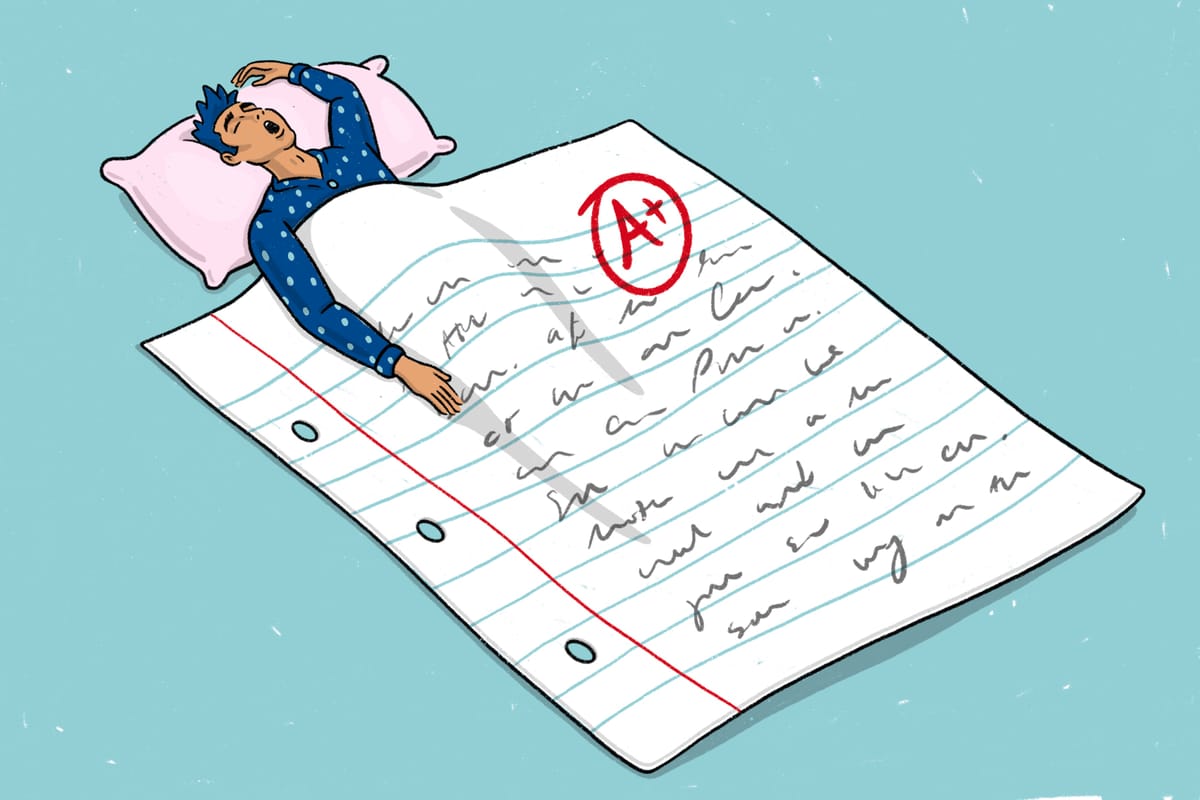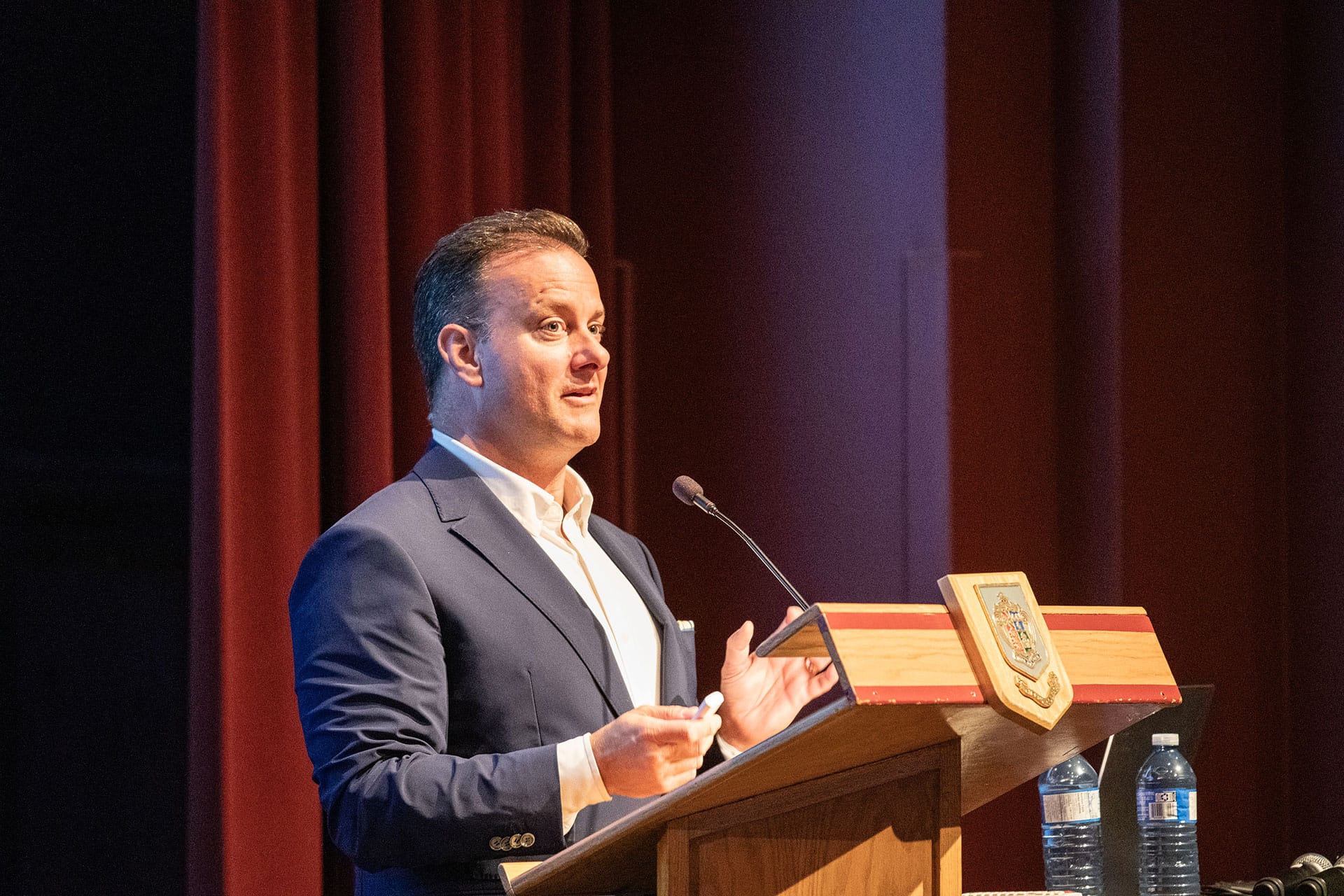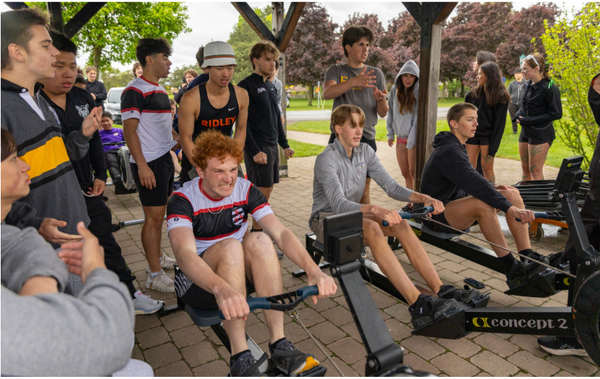Acing YOUR Exams With Sleep: Dr. Greg Well’s Insights for Better Sleep Month
By Rebecca Liu ‘25 and Rawnie Sun ‘25, Head Editors-in-Chief

In honour of May being Better Sleep Month and in pure existential terror for exams in June, The Tiger Times wanted to reach out to Dr. Greg Wells for insights into how to best use sleep to do our best on exams. We asked him for his quintessential tips, what to do right before your exam, how to use naps, and much more!
The following is a transcript of the interview with Dr. Greg Wells. It has been edited for clarity and conciseness.
Rebecca: Just jumping into the interview then! Let’s just start with our simpler questions. So, as May is Better Sleep Month, what are your basic tips for getting great sleep?
Dr. Greg Wells: I think the single most important thing that anyone can do to improve their sleep is to give themselves a little bit of time before they want to fall asleep to deactivate their brain. I truly believe it’s really important to get off of your devices for 15, 20, maybe even 30 minutes, just to give your brain a chance to deactivate. Because we’re scrolling through things and it just activates the mind and brain. It makes it really hard for you to fall asleep and stay asleep. If that is done, then the next thing that really helps is to get some sort of a temperature change in your body. That might mean a hot bath or a warm shower before getting back into your normal environment, and that will actually cool your body off. Going from hot to cold triggers the release of melatonin which helps you to fall asleep.
Those two things can make a big difference. Get off the screens, go take a hot bath, and I promise you you’re going to sleep so much better.
Rebecca: Okay, awesome! What do you think are the biggest mistakes you see students make in their sleep, especially when they’re preparing for exams or when everything’s stressful and overwhelming?
Dr. Greg Wells: Yeah, I think the biggest mistake that students make is thinking that they can pull off an all-nighter, or that it’s better to sleep less to do better on their exams, or to study more. The reason why that doesn’t work is because you have to sleep to encode the information that you’re learning into your brain so that you can remember it.
We have these 90-minute sleep cycles. In those 90-minute sleep cycles, you go through REM. In stages one, two, three, four, deep sleep, and then back up. And you cycle through that throughout the night. We encode memory and the things that we’re learning get stored in our brain during the deep sleep cycles, which happen in the first three sleep cycles, each taking 90 minutes, kind of like the first four to five hours. So, if you’re really tight for time, if you maybe haven’t studied enough during the year and you’re running up against time and you gotta stay up late and study, make sure that you get at least four and a half to five hours of sleep to make sure that all of the information that you have been studying gets into and is saved in your brain so that you can recall it on your exam.
Rebecca: What would the ideal routine be before a morning versus an afternoon exam? And then what would you say, especially for those like me who have two exams on the same day, would be an ideal routine for those who have an exam in the morning and the afternoon?
Dr. Greg Wells: Got it. So, before all your exams, you should be doing a 90-minute routine. I would do some type of exercise even if it’s as little as going for a quick walk, just to wake your body up, get the blood flowing, get it into your brain, and get moving so that you have some energy. It also helps to dissipate some of the stress. So, walk, a little bit of exercise. I would review your notes one last time, but make sure you’re not trying to learn anything because you can’t learn anything at that point. You’re just scanning things to make sure you see it all one last time. After that, I would drink some water. Make sure that you’re really, really, well hydrated. Maybe a teeny bit of caffeine, like half a cup of coffee. And then a healthy snack, like berries or nuts. And you can’t have nuts at school often but have some sort of a snack so that you have enough food fuel on board to be able to concentrate for two straight hours.
Then, in the 20 minutes before the exam starts, I would just do gentle movements like walking, stretching, loosening up, smiling, laughing, and not reviewing your notes. You’re learning nothing in the last 20 minutes. It’s not going to help you at all. All you’re trying to do is to stay calm, stay cool, stay relaxed, and activate your body so that when you sit down to get to work, you can calm your body and activate your mind. So that’s what I would do regardless if it’s a morning exam, an afternoon exam, or if you have two exams on the same day.
Rebecca: Then, maybe for those who suffer from overthinking or insomnia, or maybe they just get really bad stress before an exam, how would you help them optimize their sleep and create an ideal sleeping environment? Especially if they can’t fall asleep because they’re so nervous.
Dr. Greg Wells: If anyone is getting really stressed, really nervous, really anxious about an exam, that is always a result of you thinking about the outcome of the exam. You’re thinking about the marks you’re going to get. You’re thinking about what’s going to happen after the exam is over. What I would encourage everyone to do when you feel nervous, is to bring your attention back into the present moment. Then, you really have almost nothing to be nervous about, because in that moment you could actually be doing something.
At that moment, you could study, you could go for a walk, you could have some water, you could talk to a friend, or you could scan your notes one more time. There are so many things you can do at the moment. When we start to imagine a future that doesn’t exist yet, realize that you haven’t finished the exam. You’re visualizing getting the mark and not getting the mark that you wanted, right? You’re creating things that don’t exist yet. You don’t know what your mark is going to be. You don’t know what the questions on the exams are going to be. So don’t even go there. Just go back to what I can do now.
And what you can do now is take a bath, go to bed, do some meditation, talk to your friends, study a little bit more, get some exercise, and drink some water. These are all things that are going to make you better. So, anytime you’re nervous, just ask yourself: Okay, what can I do right now that’s gonna help me? And that gives you some agency by providing the actions that you can put into play to help you get a little bit better.

Rebecca: Perfect! Rawnie, I think you had some questions as well.
Rawnie: So, my first question would be what are the long-term consequences of poor sleep habits during exam preparation, and how can students better develop sleep practices for sustained academic success throughout the school year rather than having to cram?
Dr. Greg Wells: It’s always a challenge when we’re crunched for time, and exams are often in a busy time. You’ve got a lot to do in a very short period of time, and people often prioritize studying and/or anything else other than sleep, thinking that they don’t need to sleep in order to perform well on their exams. I think the most fundamental thing for us to realize is that when we help our brains do better, that’s what actually enables us to perform better. And what can we do to help our brains function better? The number one thing is sleep. Now, I don’t think you need to sleep for eight hours every single night during your exams. I think on average, you need at least that much over the course of the year, but during that two-week block of exams you can sleep a little bit less. I would say six hours you can get away with, four and a half if you’re really really really in trouble and need to get as little sleep as humanly possible. But an all-nighter will not help you whatsoever. So, prioritize sleep as a tool to help you to learn.
Now overall, how do we prevent ourselves from getting into a situation where we need to pull an all-nighter? That really revolves around you doing more consistent work throughout the school year to prevent you running up against the fact that you have to learn the entire course in two days right before your exam. And I’ve done that, so I get it. I am not immune to having taken that strategy on a number of courses, both in high school and in university, and I always wish that I’d done more earlier. But it was always a little bit too late, and my marks reflected that. So, the earlier that we create consistent routines around the work that we’re doing, day in, day out, the more likely it is that we’re going to be able to learn everything, and then you’re just doing review leading into an exam, and that’s not that big of a deal. So, those are the two strategies. Use sleep as a tool to do better. It’s going to help you perform better if you do. But then throughout the course of the year, try to do a little bit more, but that’s not going to help you right now. We’re talking about this during exams, right? But for next year, start early, be consistent, do a little bit every single day, not everything all at the end, and that will really make a huge difference for you.
Rawnie: Definitely. So, I think that leads pretty well to our next question. So how do you think that mental health affects sleep or vice versa? And what resources do you think Ridley specifically can provide to help students who are struggling with sleep-related issues in terms of mental health?
Dr. Greg Wells: Well, we know that mental health affects our ability to sleep. For example, if you’re nervous or anxious, it’s harder to fall asleep. And we also know that a lack of sleep causes mental health challenges like depression. We know that if you don’t sleep, it’s easier to become depressed. So, it’s really important for us to understand that sleep is a tool that you can use. It’s a practice to both optimize your mental health and make your mental health better. Now, when you’re struggling, when you’re nervous, when you’re depressed, the last thing that you want to do is sleep, because maybe it doesn’t feel like you’re getting anything done, or you’re just not in the mood, or your mind is ruminating. And I’ve been anxious. I’ve been depressed. I felt this. So, when we think about sleep as a way for us to improve our mental health, we should think of sleep as a way to make sure that our mental health is as good as it can possibly be. And when we’re not feeling great, one of the most important things that we can do to feel better sooner is to get good sleep.
And I think that that’s really, really powerful for us. So what are some of the tools that we can use to sleep better and to improve our mental health? Well, the number one tool that you can use to improve your sleep when it comes to mental health is meditation. You can use an app like Headspace or Calm or just go on YouTube and find a meditation 20-minute routine for you, like a sleep meditation. And that’s going to help you so much. The other thing that we know improves our mental health, decreases your risk of anxiety, lowers the effects of depression, and improves your sleep, is exercise. And once again, I know when you’re nervous, I know when you’re anxious, I know when you’re depressed, the last thing in the world that you want to do is to go exercise. But we know that when you do so, which can be a simple walk around the campus, it doesn’t have to be breaking a sweat or anything like that. Just go for a walk outside, move your body, go for a walk, do some yoga, lift some weight, shoot some hoops, whatever it happens to be, kick the ball, doesn’t matter. That will lower your anxiety and improve your mood while countering negative mental health.
So those are a couple of things straight off the bat that you can do. Get a nap going. Practice meditation. It will really, really help you get some exercise that will make a big, big, big difference for you and really, really help you to feel a little bit better, a lot faster.
Rawnie: What impact do you think caffeine has on sleep, and how can students manage their caffeine intake to avoid disrupting their sleep patterns during exams?
Dr. Greg Wells: Caffeine is a powerful performance-enhancing substance. It improves your performance both mentally and physically. I’ve used it with athletes, I’ve used it in a bunch of different scenarios, and I’ve used it as a student. I admit it. Although I didn’t use it in high school, I only started in college. So we know that it improves our mental performance. The problem with caffeine is it negatively affects your sleep. So, if you are going to use caffeine, it should be in the morning, but not in the afternoon because if you use it in the afternoon, it will negatively affect your sleep, which then compromises your learning. So, mornings only. The second thing is that the more you use it, the less of an effect that it has.
I strongly recommend only using it in big competitions or during exams, not the rest of the year. Because if you’re always using it, it has no effect and you get addicted, and if you don’t have it, you feel terrible. So we want to try to minimize it during the year and a little bit when you’re doing a performance like an exam or a competition. In order to make sure that you get the most out of it, try to have a little bit, about 30 to 60 minutes before you start your exam, which would be around half a cup of coffee or a cup of tea, not very much. While a tiny bit will help you to focus, a lot of it actually makes you jittery and too aware of everything that’s going on, making it hard to focus.
Rawnie: Yeah. So, you also mentioned napping earlier on. How do you think that napping can be effectively integrated into a student’s day without disrupting their sleep at night?
Dr. Greg Wells: I think that if you get up to 20 minutes, you can have an amazing map that improves your mental performance. As long as it happens before three o’clock in the afternoon, it’s probably not going to negatively affect your sleep at night. In fact, it might even help. But for students, I recommend anywhere from 5 to 20 minutes. So, set an alarm, depending on how much time you have, put your head down, close your eyes, take a quick nap, wake up, and get going. Now, when you wake up, it’s important to move your body and drink some water so you don’t have any sleep inertia. When you are studying for your exams, I recommend one 20-minute nap about every three hours. So, study for a few hours. Take a deep power nap, for 20 minutes, get up, move your body, eat some food, drink some water, sit back down, and continue studying. That could be like late morning, late afternoon, and then at night you just fall asleep. So, one nap every three hours or so. If you are studying and you notice that you’ve run up against the point where you’re reading the same line over and over again and nothing is getting in your brain, you’re not learning anymore. At that point, get up, move, get outside, and take a break. Drink some water, talk to your friends, and laugh. Don’t scroll through social media, because that’s not going to help you. But taking a little bit of a nap to recharge your brain, that’s going to make a big difference.
The physiology behind that is that when you do lots of thinking, you break down ATP, which leaves a molecule called adenosine. It's sort of like exhaust from a car that’s working really, really hard. When adenosine builds up, it’s what's making you feel tired. Caffeine blocks adenosine from having an effect, but it just blocks it, it doesn’t get rid of it. The only thing that gets rid of it is a nap. So if you want to clear your brain from adenosine so you can get back to work and keep functioning, that’s the way to go. That nap is the superpower for you moving forward.
Rawnie: So, our last and final question is: since Ridley is a super international school with a very diverse student body, how do you think cultural differences may influence sleep habits, and what can students do to learn from different sleep practices around the world to improve their own sleep habits?
Dr. Greg Wells: The amazing thing about healthy nutrition, exercise, sleep, and community, is that we know that they are all so incredibly good for us, that I believe that they are universal human truths. They’re true around the world because we all have a body and our body is the human body. Sleep is a fundamental thing that every single human on planet Earth does. We all need it. Every single one of us. There are, of course, differences in cultures, but when you look at traditional practices in most cultures, there are things that people do in the evenings to calm down, to connect, to relax, to reflect, to make our lives better. And when we integrate those practices from our culture, you can learn from many different practices from around the world and what works for you. There are inevitably differences in Asian cultures, in African cultures, in European cultures in how we calm ourselves down, connect to the people that we love, and really appreciate our lives, which is what sets us up to fall asleep and to stay asleep.
What does not work? Our devices. Technology. I love tech. I’ve got them all. I’ve got every device you can imagine all within reach right now. But when I use technology in the hour before I fall asleep, I sleep badly. I do not sleep well. Gaming does not help you sleep better. Social media will not help you sleep better. That email will not help you sleep better. We really need to get ourselves off of technology and re-practice the ways that humans have always fallen asleep, which is conversation, stories, great food, and being around loved ones. That’s what helps us to fall asleep, and that’s true for every culture around the world. But explore your culture and find out what is typically done. Let’s also share those ideas of what we do to help us sleep because they’re really cool, fun, and interesting and they always bring us together. So I think that’s a big strength of Ridley.
Rawnie: Yeah, definitely. Well, thank you so much for taking the time out of your busy schedule to meet with us!
Dr. Greg Wells: I’m super thrilled to help out. Good luck with all of your exams. Please share this widely and let me know what else I can do to help.
Rebecca: Absolutely. Thank you so much!
Dr. Greg Wells: Bye guys and good luck!


